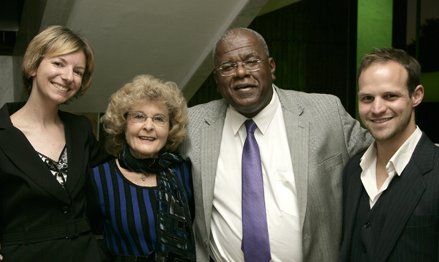Latest News Archive
Please select Category, Year, and then Month to display items
04 April 2024
|
Story Lunga Luthuli
|
Photo SUPPLIED
 Dr Juliet Kamwendo champions gender-inclusive climate action in Africa. Her expertise at the recently held AFR100 workshop highlighted vital steps towards sustainable and equitable development.
Dr Juliet Kamwendo champions gender-inclusive climate action in Africa. Her expertise at the recently held AFR100 workshop highlighted vital steps towards sustainable and equitable development.
Dr Juliet Kamwendo, Lecturer and Programme Director for Gender Studies in the Centre for Gender and Africa Studies at the University of the Free State, is spearheading efforts to integrate gender considerations into Africa's climate restoration agenda. Reflecting on her involvement, Dr Kamwendo stated, "This is particularly crucial, as women make up almost 50% of the population in Africa, and the depletion and degradation of land affect them disproportionately."
She recently served as a gender expert at the AUDA-NEPAD AFR100 workshop in Ouagadougou, Burkina Faso, from 25 to 29 March 2024. This initiative aims to restore forests and degraded land across Africa by 2030, with a focus on gender equality.
The workshop emphasised the integration of gender perspectives into the AFR100 project, acknowledging the disproportionate impact of land degradation on women. Dr Kamwendo's expertise highlighted the need to empower women in climate change interventions, addressing existing gender inequalities exacerbated by environmental degradation.
“Women – who are primarily responsible for household food security and water provision – bear the brunt of environmental degradation, leading to increased workloads, reduced income opportunities, and heightened vulnerability to climate-related disasters. Furthermore, the loss of forest cover and biodiversity further exacerbates the challenges faced by women, particularly in rural areas where they depend heavily on natural resources for their livelihoods,” added Dr Kamwendo.
Her participation highlights academia's crucial role in fostering inclusive and sustainable development, emphasising interdisciplinary collaboration to tackle complex environmental challenges. Through initiatives such as AFR100, stakeholders are working towards a more resilient and gender-responsive future for Africa.
'England, the English and the problem of education in South Africa.’
2013-09-26
|
 |
Attending the lecture were, from the left: Dr Susan Brokensha, Senior Lecturer: Department of English; Prof Rosemary Gray, Professor Emeritus (Honorary Life Vice-President of the English Academy of Southern Africa); Prof Jonathan Jansen; and Dr Thinus Conradie, Lecturer: Department of English.
Photo: Johan Roux
26 September 2013 |
Prof Jonathan Jansen: Lecture
The university celebrated the life of one of South Africa's most renowned art critics, hosting the 2013 English Academy’s Percy Baneshik Memorial Lecture on the Bloemfontein Campus.
The keynote lecture was delivered by Prof Jonathan Jansen, Vice-Chancellor and Rector, who joined a distinguished list of speakers to have delivered the lecture. Presented annually by the English Academy of Southern Africa, an association dedicated to promoting the effective use of English as a dynamic language in Southern Africa, past speakers include Prof Es’kia Mphahlele, Prof Njabulo Ndebele, Dr Alan Paton and Prof Albie Sachs. The lecture is hosted at venues across the country and this year Bloemfontein paid tribute to Percy Baneshik.
In his speech Not even colonial born: England, the English and the problem of education in South Africa,' Prof Jansen addressed the dilemma of the politics of language in both school and university education today.
Talking about the dominance of English in schools, Prof Jansen said it is the language of choice because indigenous languages are so poorly taught. "Simply learning in your mother tongue is absolutely no guarantee of improved learning gains in school. The problem is not the language of instruction; it is the quality of teaching, the knowledge of curriculum and the stability of the school."
Prof Jansen told the audience in the CR Swart Hall that Afrikaans-exclusive, or even Afrikaans-dominant white schools represent a serious threat to race relations in South Africa. "You simply cannot prepare young people for dealing with the scars of our violent past without creating optimal opportunities in the educational environment for living and learning together."